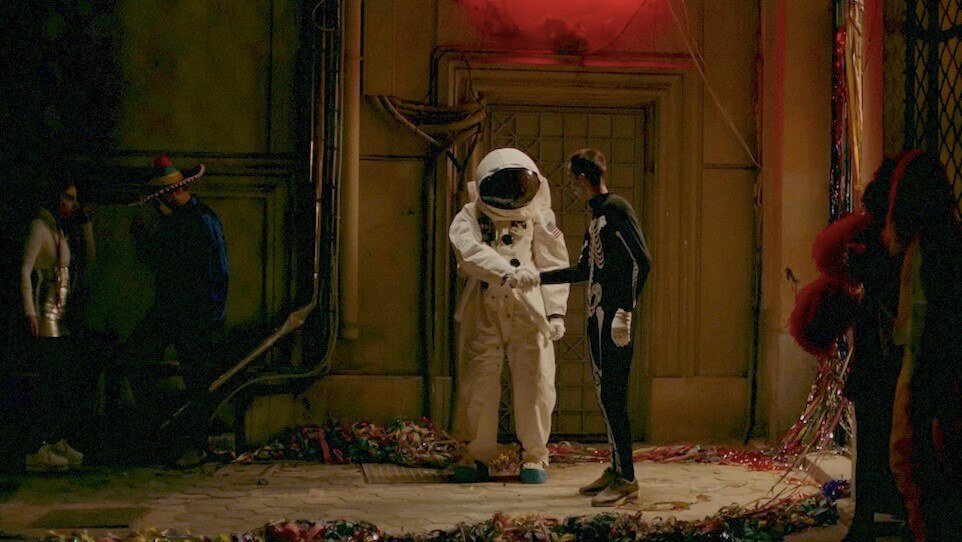Directed by: Christos Nikou
Written by: Christos Nikou and Stavros Raptis
Starring: Aris Servetalis, Sofia Georgovassili, Anna Kalaitzidou, Argyris Bakirtzis, and Kostas Laskos
Runtime: 86 minutes
Pick ‘Apples’. This eccentric, minimalist dramedy is one of the year's best films.
It’s a pandemic!
No, not COVID-19, but without warning, various Greek citizens succumb to mysterious cases of amnesia. Medical experts can’t pinpoint the transmission methods or the underlying reasons why someone suddenly cannot recall their name, spouse, or home address.
Worse yet, a discernable cure isn’t anywhere in sight, and the condition appears permanent.
Thankfully, Athens isn’t under a lockdown, and doctors don’t wear protective attire or squirt frequent dabs of sanitizer when treating their new forgetful patients, but director/co-writer Christos Nikou and co-writer Stavros Raptis don’t exactly provide the numbers of poor souls infected with memory loss.
However, we realize a severe public health dilemma is playing out, and Greece isn’t the only country impacted. This is a worldwide problem.
Do you have PTSD yet? “Apples” may spark some unpleasant 2020 and 2021 memories, but COVID wasn’t even a thought in Nikou’s head when making “Apples”. He began writing the script about a decade ago.
“It was strange. We did our final test screening of the film that last day before the lockdown in Greece,” Nikou said in a Scott Roxborough’s Sept. 12, 2020 Hollywood Reporter interview.
Fortunately, his movie does NOT feature ventilators, lengthy vaccination lines, social distancing, and medical masks. Masks make appearances, but in the form of Batman and Catwoman cowls and a few other costume face coverings during one scene.
Christos – a former assistant director to Yorgos Lanthimos – brings a quirky, off-center vibe to his first feature film. Rather than address global impacts, the script squarely and eccentrically focuses on Aris’ (Aris Servetalis) story. “Apples” is a contained narrative, but it bursts with enormous perceptions of the human condition through examples of societal order, individual connections, and grief.
Actual apples – maybe McIntosh or Red Delicious - figure into the movie, but this review will not reveal the ways.
As the film opens, we see a 40-something Aris cope with an unknown stressor. At this point, Aris has all of his faculties and lives in vibrant, modern-day Athens. He apparently resides near the business district, as concrete and steel cover the urban landscape. We don’t know the year. Life looks like the 21st century, but no one carries a cell phone, and we see Aris use a cassette tape recorder, so who knows.
Early in the first act, Aris suffers the aforementioned recall-inhibited fate and is immediately shipped to a hospital. The man has no identification (admittedly, a plot convenience) and no recollection of a family, job, or history. Aris does remember his native tongue and some basic social constructs, but he’s oblivious to pop culture, and two cognitive tests suggest that short-term memory is an issue, too.
Not good.
However, an unnamed physician or social worker (Anna Kalaitzidou) recommends that Aris enter the New Identity Program.
Aris now lives in a comfortable halfway house with state-provided necessities. He has free will throughout most of his waking hours, but the program’s managers (Kalaitzidou and Argyris Bakirtzis) assign tasks for our tall, thin, bearded 40-something protagonist to follow. These rote, straightforward chores – designed to trigger memories from his past or provide a new foundation - are easy to complete, but Nikou ensures to include awkward, comedic mechanics and visuals that harken back to Lanthimos’ films, like our hero riding a kid’s bike that is way too small for his lanky frame. Still, Aris plays ball because he has nothing but time.
Even though Athens’ population is about four million, Aris is frequently featured by himself or only with one or two others in the frame. This approach helps keep the spotlight – during the 86-minute runtime - on our troubled friend, but it also acts as a metaphor for his struggle. Aris battles inside his head, but he doesn’t act out his frustration through sharp, kinetic movements (except once during the film’s opening scene, before his current condition).
Instead, Nikou relies on Servetalis’ performance through the actor’s subtle nuance captured in close-ups. Servetalis unquestionably succeeds at conveying Aris’ varying degrees of confusion with minimal moments of actual dialogue. Aris isn’t Marcel Marceau by any means, but he doesn’t feel the burning desire to spout off his problems to anyone who will listen, like 99 percent of the Real Housewives of Beverly Hills, New Jersey, Atlanta, or pick your city.
No, he’s struggling in silence.
However, the script introduces a potential ally, Anna (Sofia Georgovassili), who muddles through the same journey as Aris. He doesn’t know much about Anna, but with her genuine, agreeable persona, we hope she becomes his lifeline or a possible love interest.
Aris needs to catch a break. Everyone could use a little luck during a pandemic.
Jeff’s ranking
3.5/4 stars
















